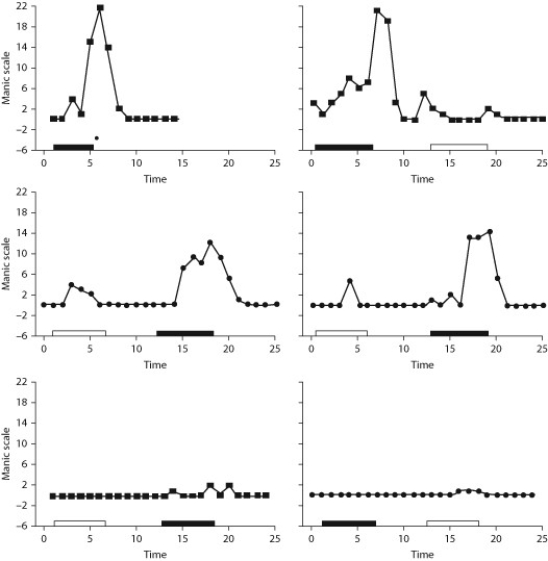Multiple Choice
Anabolic steroid abuse, the self-administration of hormones such as testosterone for body building or other nonmedical uses, is an increasing concern in society. A study of the effects of added testosterone on behavior yielded the data shown below. They are from the responses to testosterone treatment based on a scale of manic (excited or irritable) behavior for six adult males. Black bars indicate testosterone administration time and white bars indicate placebo administration time. The asterisk for the first subject indicates discontinuation of testosterone treatment after week 5 because of rapidly escalating manic symptoms.
 Source: Pople, H. G., Kouri, E. M., & Hudson, J. I. (2000) . Effects of supraphysiologic doses of testosterone on mood and aggression in normal men: a randomized controlled trial. Archives of general psychiatry, 57(2) : 133-140.
Source: Pople, H. G., Kouri, E. M., & Hudson, J. I. (2000) . Effects of supraphysiologic doses of testosterone on mood and aggression in normal men: a randomized controlled trial. Archives of general psychiatry, 57(2) : 133-140.
-Abnormal levels of testosterone might also be expected to cause
A) dehydration.
B) diabetes.
C) goiter.
D) reproductive difficulties.
Correct Answer:

Verified
Correct Answer:
Verified
Q26: Which molecule in this figure portraying water-soluble
Q27: An excess of T<sub>3</sub> and T<sub>4</sub> in
Q28: Results of the experiment yield the data
Q29: Which hormone stimulates and maintains metabolic processes?<br>A)
Q30: Feeling tired after a long day of
Q32: Which is an endocrine gland that raises
Q33: Compared to the endocrine system, the nervous
Q34: Which is a nonsteroid hormone?<br>A) glucagon<br>B) cortisol<br>C)
Q35: Which endocrine gland synthesizes melatonin?<br>A) pineal<br>B) adrenal
Q36: Which option correctly pairs an endocrine gland